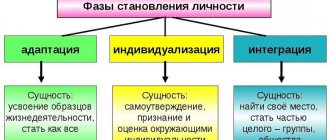Human development is a complex and multifaceted process of formation and development of personality, occurring under the influence of controlled and uncontrollable, external and internal factors. Child development involves a process of physiological, mental and moral growth, covering various qualitative and quantitative changes in hereditary and acquired properties. It is known that the development process can occur according to different scenarios and at different speeds.
The following factors of child development are identified:
- Prenatal factors, including heredity, maternal health, the functioning of the endocrine system, intrauterine infections, the course of pregnancy, etc.
- Child development factors associated with childbirth: injuries received during childbirth, all kinds of lesions resulting from insufficient oxygen supply to the baby’s brain, etc.
- Prematurity. Babies born at seven months have not yet completed 2 months of intrauterine development and therefore initially lag behind their timely born peers.
- The environment is one of the main factors influencing the development of a child. This category includes breastfeeding and further nutrition, various natural factors (ecology, water, climate, sun, air, etc.), organization of leisure and recreation for the baby, mental environment and family atmosphere.
- The gender of the baby largely determines the speed of development of the child, since it is known that girls are ahead of boys at the initial stage and begin to walk and talk earlier.
It is necessary to consider in more detail the factors influencing the development of the child.
Biological factors of child development
Many scientists agree that it is the biological factors of child development that play a key role. After all, heredity largely determines the level of physical, mental and moral development. Every person from birth has certain organic inclinations that determine the degree of development of the main aspects of the personality, such as types of gifts or talents, the dynamics of mental processes and the emotional sphere. Genes act as material carriers of heredity, thanks to which a small person inherits the anatomical structure, features of physiological functioning and the nature of metabolism, the type of nervous system, etc. In addition, it is heredity that determines the key unconditioned reflex reactions and the functioning of physiological mechanisms.
Naturally, throughout a person’s life, his heredity is corrected by social influence and the influence of the education system. Since the nervous system is quite plastic, its type can change under the influence of certain life experiences. However, the biological factors of a child’s development still largely determine a person’s character, temperament and abilities.
Genetics
Genetic characteristics of a child’s character appear quite often and are one of the factors influencing the child’s upbringing. As they say, “from the aspen tree no oranges are born,” and very often the character of the parent is passed on to the child. It is not surprising if your child is hyperactive, if as a child you yourself could not sit still.
You can correct a child’s character, but you should not break his fragile world by introducing important life values through punishment. Only a discussion of actions and a personal example can show a child the importance of the ability to control oneself and restrain one’s negative emotions and impulses.
Factors in child mental development
Prerequisites or factors for a child’s mental development include various circumstances that affect his level of mental development. Since a person is a bio-social being, the factors of a child’s mental development include natural and biological inclinations, as well as social living conditions. It is under the influence of each of these factors that the child’s mental development occurs.
The most powerful influence on the psychological development of a child is the social factor. It is the nature of the psychological relationship between parents and the baby in early childhood that largely shapes his personality. Although the baby in the first years of life is not yet able to understand the intricacies of interpersonal communication and understand conflicts, he feels the basic atmosphere prevailing in the family. If love, trust and respect for each other prevail in family relationships, then the child will have a healthy and strong psyche. Young children often feel their own guilt in adult conflicts and may feel their own worthlessness, and this often leads to mental trauma.
The mental development of a child is mainly subject to several key conditions:
- normal functioning of the brain ensures the timely and correct development of the baby;
- full physical development of the baby and the development of nervous processes;
- the presence of proper upbringing and the correct system of child development: systematic and consistent education, both at home and in kindergarten, school and various educational institutions;
- the preservation of the sense organs, thanks to which the baby’s connection with the outside world is ensured.
It is if all these conditions are met that the baby will be able to develop correctly psychologically.
What influences the development process
We have found that personality development is influenced by genetics, upbringing and society. Is there an additional mechanism for the formation of an individual besides these factors? At a conscious age, a person can independently manage his development by choosing one or another educational field. Until adulthood, parents played a decisive role in the development of personality:
- they chose a suitable environment for the child;
- they chose a school for him and took him to clubs.
That is, until conscious age, this process was completely controlled by parents.
Psychologists say that personality develops unevenly. This process manifests itself most actively during training. Subsequently, development stops or disappears completely.
Stages of personality development:
- preschool age;
- school age;
- student years;
- age 26-30 years;
- age 30-35 years;
- age 35-40 years;
- age 40+ years.
Active personality formation and development occurs from the moment of birth until the age of 276, when a person graduates from university. During these years, a person quickly assimilates new knowledge, becomes interested in everything new and forms his own worldview.
After 26 years, there is a decline, a person concentrates on forming a family, and he has no time for new knowledge and skills. However, if a new hobby appears during this period, it gives impetus and impetus to self-development.
After 35 years, a person continues to develop, but the brain does not work as intensively, and knowledge is absorbed much more slowly. After forty years, there is a noticeable decrease in the level of attention; memory does not work at full capacity. Physiological changes occur in the body, which affect the individual’s quality of life.
Social factors of development
Special attention should be paid to one of the main factors in the development of a child’s personality – the social environment. It contributes to the formation of a child’s system of moral norms and moral values. In addition, the environment largely determines the child’s level of self-esteem. The formation of personality is influenced by the child’s cognitive activity, which includes the development of innate motor reflexes, speech and thinking. It is important that the child can acquire social experience and learn the basics and norms of behavior in society.
As the child grows up, factors in the development of the child’s personality may also change, since at different ages a person occupies a certain place in the system of social relations existing around him, he learns to perform responsibilities and individual functions. Factors in the development of a child’s personality determine his attitude to reality and his worldview.
Thus, the factors of a child’s development shape his activity and role in society. If the correct education system is practiced in the family, then the child will be able to move on to self-education earlier, develop moral fortitude and build healthy interpersonal relationships.
What conditions will ensure successful personality formation?
Important conditions for the formation of a child’s personality.
Example of parents
It is important for a child to see that mom and dad do not follow a certain script, but really live a happy and fulfilling life. It is impossible to make another person happy if you yourself are unhappy. Many psychologists note that people who do not experience inner harmony often complain about problems in relationships with children. Only happy parents will be able to truly understand their child by building a trusting relationship with him. This contributes to the successful formation of personality. When trying to help your child with this, start with yourself. Reflect: do you know how to accept your feelings, do you allow yourself to truly be happy and sad. Or maybe you are restraining yourself and teaching your child excessive restraint, thereby suppressing his personality.
Communication with others
Show by example how to communicate with other people. Give yourself a little test by honestly answering the question: “Are you able to have an unbiased conversation with a person with whom you disagree in some aspects?” Is there a possibility that you are trying to impose an opinion on another person or are you submitting to someone else’s will? The child will probably adopt this feature from you.
Don’t impose your opinion and position – just share your values. Have you heard the definition of “heartfelt conversation”? Such dialogues arise when a person is ready to understand the interlocutor and share his opinion. In relationships, a person develops, allow yourself to learn new things and teach this to your child.
Care and attention
A person who has felt care and attention at the dawn of development will certainly feel confident and protected. Mother and father become important life references, exerting serious influence. It is great if a mother can demonstrate such qualities as forgiveness, acceptance, love. The child needs to feel affection and warmth. In a father, strictness and gentleness are important, acting undividedly.
Parents are the most important stage in the formation of personality. Everyone knows the words that raising children should begin with their own upbringing. Start with yourself if you want to help your child’s personality acquire important facets.
External environmental factors ensuring normal child development
The implementation of the information of any gene depends primarily on the influence of the internal environment created by other genes, and then on the external environment, which influences both the genotype as a whole and its individual parts. External environmental influences include all non-genetic influences that act on the developing organism before and after birth. During intrauterine development, the environment for the fetus is the mother’s body, which provides appropriate temperature, nutrition, respiration and other vital factors. After birth, a child, as a social being, spends a long time in an environment artificially regulated by adults according to the capabilities and needs of his body. The question itself of the interaction of the genotype with the external environment at all stages of a child’s development is easily understandable. The difficulty is that it is difficult to predict how this or that environmental factor will affect each individual.
When studying differences between individuals, the relative influences of heredity and environment can be more definitely taken into account by analyzing the measurable components of a trait. For example, body weight can increase with increasing calorie intake. However, this does not mean that all individuals with the same increase in caloric intake will experience the same increase in body weight. In people with a low metabolism, the increase will be greater, with a high one - less. Two or more genotypes will give similar reactions under some conditions, but significantly different or completely opposite ones under others. Only monozygotic twins, as having identical genotypes, usually react almost identically to the same environmental influences.
Studying the phenotypes of two monozygotic twin children raised in the same family and two dizygotic twins also living in the same family makes it possible to find out how the same environment affects the formation of phenotypic characteristics in children with identical and different genotypes. Research shows that in monozygotic twins, reactions to the same environmental agents are 70-80% identical, while in dizygotic twins, coincidence in the manifestation of a trait is 2-3 times less common. Of great interest are data on changes in characteristics or on the nature of reactions to external environmental agents when monozygotic twins live and are raised in different conditions. In this case, the coincidence (concordance) in the manifestation of reactions in monozygotic twins is significantly higher than in dizygotic twins. The interest of such studies lies not only in the fact that they prove the primary importance of hereditary information in the formation of phenotypic characteristics, but also in the fact that in a certain percentage of cases with the same genotype, there is a discrepancy in reactions to the influence of environmental factors. Establishing the causes of different reactions to the same environmental agents in monozygotic twins will make it possible to have a more targeted impact on the formation of positive phenotypic traits and to prevent diseases.
Many diseases develop due to the unfavorable influence of environmental factors: bacteria, viruses, fungi, animal parasites, etc. Poor nutrition, unfavorable seasonal and climatic factors predispose to diseases or directly cause pathological conditions. However, when exposed to them, some people become ill, while others remain healthy or have a mild form of illness.
Determining predisposition and resistance to diseases in children, which makes prevention more individualized and targeted, is possible using a number of methods. The most accessible of them, especially to the local pediatrician, is a method of studying the child’s family, which pays attention to nutritional characteristics, the nature of living conditions, material security, parental culture, relationships between parents and children, methods of education, compliance with the child’s regime, etc. Against the background In all this, it is important to collect a genealogical history and compile his pedigree in the child’s development card, which must be clarified at every meeting with relatives by interviewing and even examining them. Particular attention should be paid to the prevalence of diseases in the generations closest to the patient in a given family.
Predisposition or resistance to diseases may be indicated by previously observed reactions in the child to external agents (allergies, etc.) and diseases. The characteristics of physical and neuropsychic development, as well as the constitutional characteristics of the child, may be of some importance for diagnosing a tendency to disease.
It is no secret that people have different levels of intellectual development, and this difference is noticeable already in childhood. But what is the reason? What factors determine human intellectual development? In this article we will look at the key of these factors and understand the impact they have.
What mistakes do parents make when raising individuals?
When shaping a child’s personality, it is important for parents to avoid such common mistakes.
Categorical prohibition
The main mistake of education. Be patient with your baby and respect him. Without learning to understand it, parents make inevitable mistakes that lead to mental and physical problems. By ignoring the desires and interests of the child, responding to most of them with categorical prohibitions, you can even skip the initial stage of some disease. Example: you notice that the child has started eating lime. The first reaction of most parents: dissatisfaction, screaming, a ban on approaching the wall. Correct reaction: visit the doctor. The doctor will probably tell you that there is a lack of calcium salts in the baby’s body. In addition, such an attitude will create in the child a desire to perform certain actions on the sly. Many become secretive and distrustful.
Overprotection
When shaping a child’s personality, overprotection is not the best helper. Excessive care can have a negative effect on the baby. When he reaches a certain age and tries to show independence, this is often met with hostility. Example: a child wants to use a spoon himself, but the mother, fearing that he will get dirty or not be able to cope, continues to feed him herself.
Overprotection manifests itself in violent action, which can result in the emergence of neurosis. In other cases, guardianship unless absolutely necessary can result in the child never being able to make friends, because the mother and grandmother are always nearby. The individual may have difficulties with socialization; he does not acquire the ability to express and defend his opinion. Possible consequences: psychological problems that can only be eliminated with the assistance of specialists.
Excessive demands
For the full development of a child’s personality, it is necessary that he not only knows, but also understands what is allowed and what is prohibited. If you show excessive demands on him, without giving clear explanations of the reasons why you need to do as you say, then this will not lead to good. What traits will the personality acquire? Irritability, stubbornness. The best option: parents explain in detail the reasons for their demands, and over time they become the child’s personal beliefs.
Notations
The first factor provoking children's protest is lengthy lectures. Parents often believe that their child will learn information better by listening to long and repetitive lectures. There is no need for them. This approach has no constructive component. Particularly taboo is other children being held up as examples. Gradually, the child will begin to perceive them as personal enemies. Boring notations often cause a negative reaction, losing their educational value.
Immense pampering of a child
Parents who spoil their children too much create a big problem. This phenomenon is no less negative than lack of influence. Spoiled children, who do not know anything to be denied, who have no responsibilities, eventually face the impossibility of overcoming even minor life obstacles and problems. When a situation arises when their desires and reality do not coincide, they lead to overstrain of the nervous system, which can result in a breakdown.
Environmental factors
Insufficient food intake in the first six months of life can greatly affect the development of the child. However, if after six months he begins to eat normally and live in stable conditions, by 4-5 years he catches up with his peers in development. But such an experience should, of course, be avoided.
Mental stimulation is also extremely important. If a baby experiences a deficit in communication, then by the second year of life he begins to lag behind in the speech and motor spheres.
Therefore, it is important to constantly communicate with the child, give him the opportunity to manipulate various objects and master various new skills, learn something.
Family factors
The more children there are in a family, the lower their IQ. This was proven in the 1970s in the Netherlands. The number of people studied was more than 300,000 young men with an average age of 19 years. Moreover, firstborns, as a rule, are smarter than their younger brothers and sisters.
Also, the level of development of a child depends on the social environment. In France, a study was conducted in 1980: they compared the IQ of children from poor families, but raised in a privileged class, and their brothers and sisters raised in a lower social class. The difference was approximately 20 points in favor of those brought up in a privileged society.
School influence
At school, obedience is most valued. This often acts as a limitation for creative children. Many restrictions, rules and patterns stifle their natural originality.
Back in the twentieth century, the Italian Maria Montessori proposed an education system in which each child studies at his own rhythm, that is, individually. This led to positive results. But since freedom and independence are not allowed by society, the Maria Montessori method is not used.
Mass media
Nowadays, the media plays a huge role in raising a child. The knowledge children gain from watching TV shows and pages on the Internet often has a detrimental effect on the child’s upbringing. It is very difficult to control this process, but parents are able to instill in their child an interest in positive examples from life, then children will try to look for information that will be useful.
There are many factors influencing the upbringing of a child. It is important for parents to be able to control them, because it is the family that plays the most important role in education.
Personal qualities of the child
Much depends on character and temperament. For example, it will be quite difficult for phlegmatic people to express themselves at school. They may begin to be considered incapable simply because of their temperament.
Children can be roughly divided into thoughtful and impulsive. The former can delve into the task and work with it as much as they need, despite the complexity. The latter are aimed at quick results, so they often give the answer that first came to mind. This makes the learning process difficult.
Also, thoughtful children avoid participating in the life of the group (class) and try not to get into unfamiliar social situations. Impulsive people easily join the team and are not afraid to take risks.
Patterns of education
Now let's look at the patterns operating in the educational component of the education system. According to our definition, they will be specific (private), since they describe only relations in the education subsystem.
The laws of education are general, objective, constant relationships that exist between the phenomena and processes of education. In education, many laws operate simultaneously. Although at first glance it seems that in this process there are many accidents caused by a combination of circumstances and uncontrollable conditions, the processes and results of education are deeply determined by the action of main and not always noticeable forces. The patterns of education reflect the relationships and interdependencies between its main components.
As in other processes, there is a simultaneous and complex action of many links here. Some of them relate to individual aspects (parts, components) of the process, others cover the system as a whole, and there are those whose influence goes beyond the educational system and extends to all processes of human development and formation. The first, as we already know, are called private, the second - general, and the third - general laws of education.
The scope of general laws extends to the entire system of the educational process. Let us recall that they express the connections between the main, largest components of this process. General patterns include in their scope connections in individual components of the system - private (concrete, specific) patterns. This is the hierarchy of patterns. The educational process, in turn, as part of a more general educational process, is subject to its own specific laws. It also reveals interconnections characteristic of even larger systems - development and education, and these systems themselves are components of a common global system - human life. This leads to an awareness of the enormous complexity and multi-level nature of education. Of course, the general patterns to be analyzed do not reflect all the relationships; they are only a small part of the interdependencies that permeate the system.
More important for practice in education is the connection between the productivity (efficiency, quality) of the educational process and those components that have the greatest impact on it. Thus, on the one hand, we fix a large component (influence, condition, action), and on the other hand, the productivity of the educational process.
Personal qualities of parents
Children with a high level of intellectual and creative development, parents usually have a positive attitude towards life and love their work.
Parents of children with a high level of intellectual development are energetic and dynamic, prefer cultural pastimes, and are distinguished by independence of opinion, nonconformism, and freedom in decision-making.
If parents themselves have a high level of development of creative and intellectual abilities, if they give the child the opportunity for development, support him and respect him, then this has a beneficial effect and helps the child realize his maximum potential.
Personal motivation
To achieve your goals and be successful, you need personal motivation. And developing it in a child is one of the important tasks of parents. To do this, you need to be in contact with the child, properly organize individual and joint activities, and use non-material incentives. It is important not to make your child dependent on praise and disapproval. If you praise only for successes and reproach for failures, then instead of motivation, the child will develop a fear of defeat.
We have created an environment for the comfortable comprehensive development of children. Our classes are structured using special methods, and our teachers know how to competently develop personal motivation in a child and interest him.









